Learn
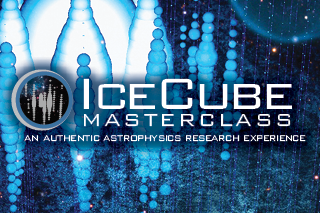
IceCube MasterClass at WIPAC
WIPAC is one of the institutions hosting the initial IceCube Masterclass, an educational program of the IceCube Collaboration launched in 2014.
In 2016, the IceCube masterclasses will be held at eleven research institutions in the US and Europe and, for the first time, will include a Spanish session in Madison. We invite our young students—our future scientists—to learn about particle astrophysics by doing real research.
The IceCube Masterclass is a one-day event where high school students learn about astrophysics through lectures and hands-on analysis of data from the IceCube Neutrino Observatory, located in Antarctica at the South Pole. Students will also have lunch with IceCube researchers and will discuss their results in a virtual meeting with other students from across the US or from other countries in Europe.
For more information, please visit icecube.wisc.edu/masterclass
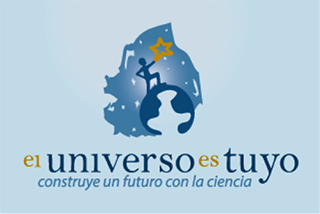
¡El Universo es Tuyo!
¡El Universo es Tuyo! (The Universe is Yours!) is an initiative that seeks to engage Madison’s Spanish-speaking community through the science of the universe. Activities planned for this year include: stargazing, sungazing, public talks, a Masterclass for high school students, as well as the opportunity for students to intern with WIPAC and Centro Hispano. People of all ages are encouraged to participate! This effort is made possible through a partnership with UW Space Place and in collaboration with: Centro Hispano, UW Arboretum, the Aldo Leopold Center, HAWC, and IceCube.
Download the program of activities here. For more information, contact universo@wisc.edu.
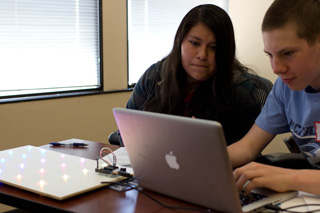
WIPAC High School Interns
The high school internship program provides students in the Madison, Wisconsin, area the opportunity to work on a real-world physics experiment. Students learn how to write computer programs, get to know working astrophysicists, and contribute to data analysis. All interested students are encouraged to apply; no physics or programming background is necessary.
Individual projects are catered to the interests of each student.
Applications for the program are accepted at the beginning of each semester.
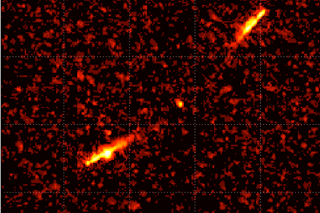
DECO, the cosmic-ray detector in your pocket
The Distributed Electronic Cosmic-Ray Observatory (DECO) is an effort to harness the global network of mobile devices to detect cosmic radiation. DECO is part of the Global Sensor Web, a framework for collecting data from distributed sensors.
DECO is a cosmic-ray detector app that runs on Android OS (iOS is in development). The app works by recording a camera image once every 1-2 seconds, when there´s no light reaching the camera. Those images are then analyzed to identify cosmic-ray events.
WIPAC is currently working with high school teachers and students to improve the app and to create curricula and resources to foster the use of the app in the classroom.
The project is supported by the American Physical Society, the Knight Foundation, and the Simon-Strauss Foundation. Teacher participation is supported by QuarkNet.
For more information, please visit wipac.wisc.edu/deco
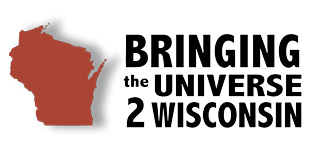
Bringing the Universe to Wisconsin
Bringing the Universe to Wisconsin is a two-year public education program funded by the Ira and Ineva Reilly Baldwin Wisconsin Idea Endowment. The project centers around all 26 University of Wisconsin System schools, where we are committed to giving campus presentations and providing community events.
Events range from campus colloquia to large-scale, interactive, family events. Topics we cover during Bringing the Universe to Wisconsin events include the challenges of constructing a huge research facility at the South Pole as well as neutrino astronomy, the search for dark matter, computer science, and cosmic rays.
Universe to Wisconsin events have been held in elementary schools, service clubs, coffee shops, and other locations. For more information about the project and past and current events, visit universe.wisc.edu.
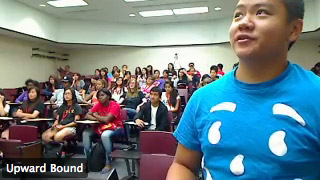
Webcasts
Live connections with scientists and specialists at the South Pole Amundsen-Scott Station are offered each austral summer. Webcasts transport audiences across the globe to the coldest, most remote place on Earth where international collaborations are developing new ways to explore the universe.
Participants learn about the three WIPAC projects—IceCube, ARA, and DM-Ice—and the wide range of talent it takes to develop and run a successful project at the South Pole. Scientists, technicians, graduate students, and support personnel like chefs, plumbers, medical staff, communications technicians, and engineers all play vital roles in the operation of the South Pole station. Students and the public have a chance to ask questions and hear firsthand from professionals about what it is like to live and work in one of the most extreme environments on Earth.
Everyone is welcome to join our webcasts—teachers and their students, college students, researchers, the media, and members of the public. Participation is free and requires minimal technology. To learn about future webcasts, please fill out this form. Webcasts from the 2012-13 season are archived and available for download on the IceCube site
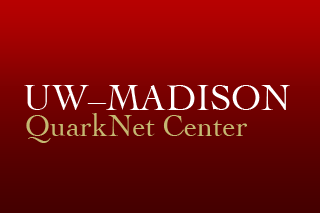
UW–Madison’s QuarkNet Center
WIPAC leads and hosts UW–Madison’s QuarkNet Center, which aims to develop innovative and genuine astrophysics research experiences for high school teachers and students. QuarkNet, a national program sponsored by NSF and the U.S. Department of Energy, partners with universities and research labs around the country to offer unique professional development for physics teachers and engaging research experiences for their students.
Our QuarkNet activities include the IceCube Masterclass in Madison, the teacher workshop “Astrophyiscs in the Classroom” held during the summer, and other opportunities for teachers and students to engage in specific research and outreach projects.
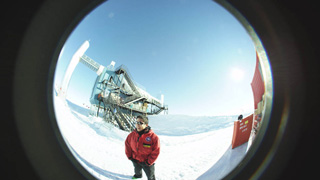
Planetarium Partnerships
WIPAC is excited about working with the Daniel M. Soref Planetarium at the Milwaukee Public Museum to produce a fulldome planetarium show about the IceCube Neutrino Observatory. WIPAC staff were able to take a special camera to the South Pole during the 2012-13 season to shoot video. The final production, Chasing the Ghost Particle is now captivating audiences around the world.
WIPAC funds helped to upgrade the planetarium at the University of Wisconsin–River Falls with a digital projector, allowing it to move beyond standard viewing of the night sky to become a broader visualization center. Plans are underway to expand the network of digital domes across the state of Wisconsin. This network will efficiently and effectively connect geographically dispersed audiences to allow exploring the universe in new ways.
